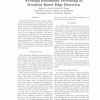Free Online Productivity Tools
i2Speak
i2Symbol
i2OCR
iTex2Img
iWeb2Print
iWeb2Shot
i2Type
iPdf2Split
iPdf2Merge
i2Bopomofo
i2Arabic
i2Style
i2Image
i2PDF
iLatex2Rtf
Sci2ools
MVA
1994
1994
Avoiding Redundant Processing in Gradient Based Edge Detection
nique can produce computational savings of up to fifty percent in some instances. Gradient based edge detection produces edge lo
Related Content
| Added | 02 Nov 2010 |
| Updated | 02 Nov 2010 |
| Type | Conference |
| Year | 1994 |
| Where | MVA |
| Authors | Martin J. J. Scott, Richard W. Prager |
Comments (0)

